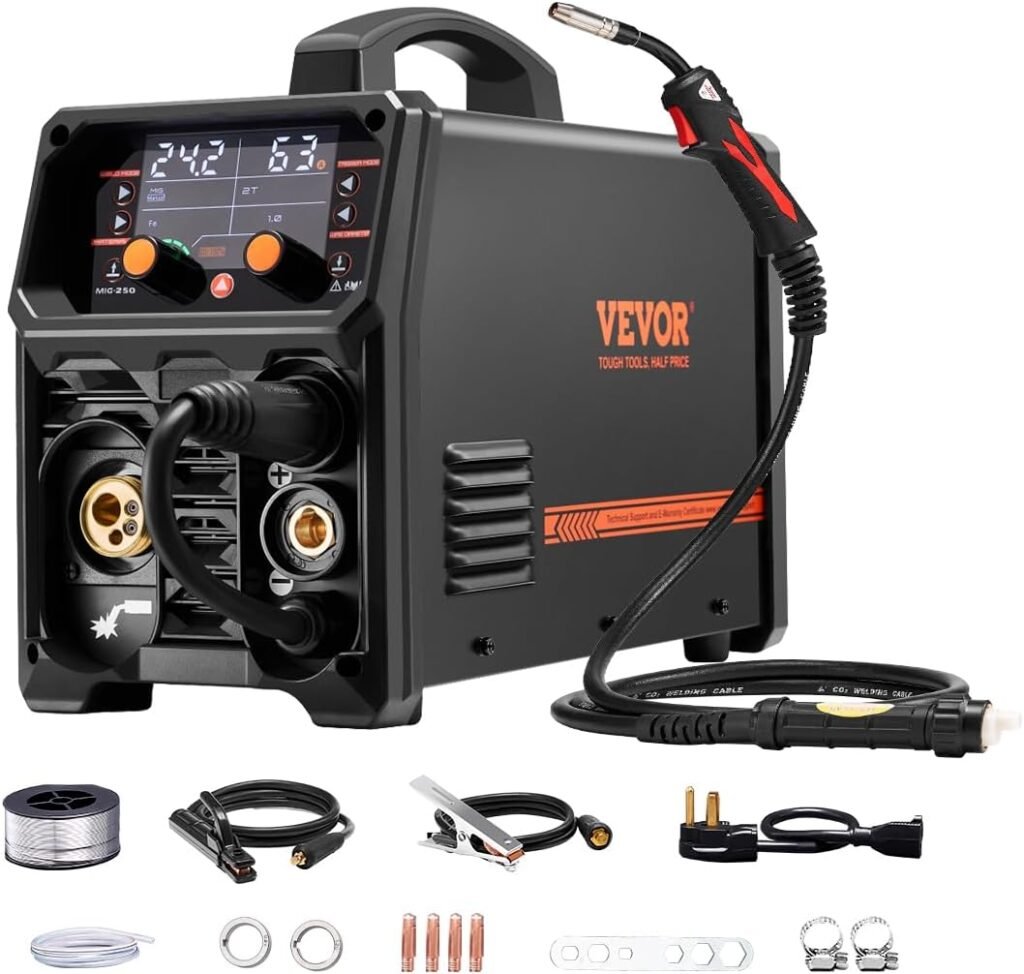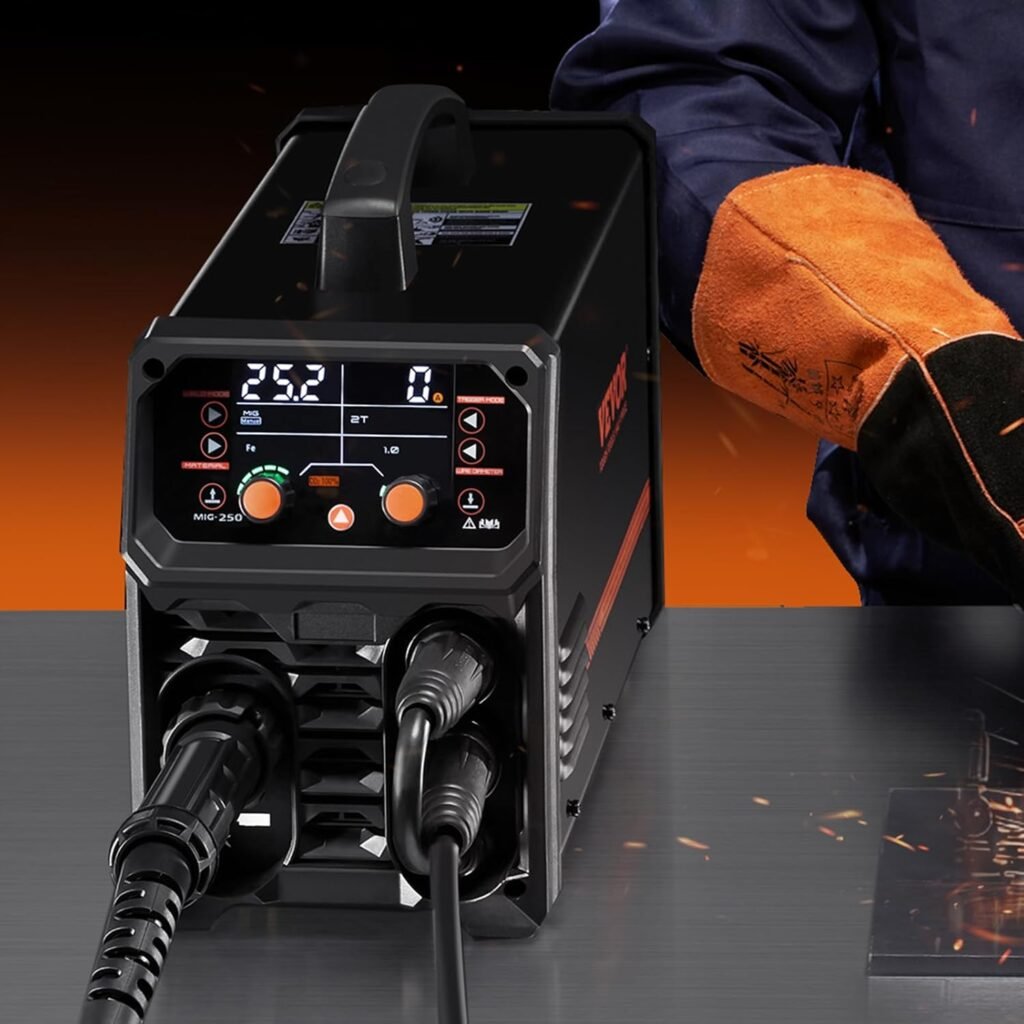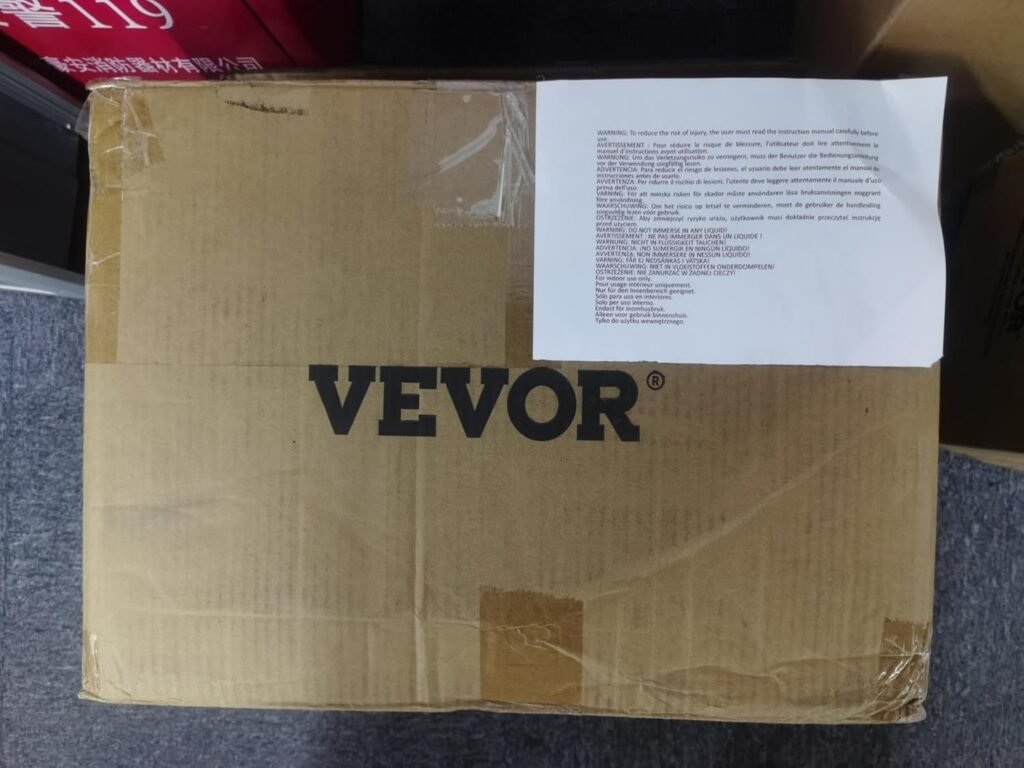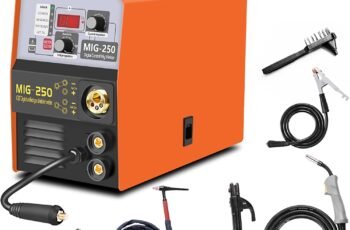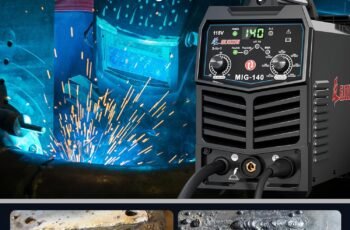Ad Blocker Detected
Our website is made possible by displaying online advertisements to our visitors. Please consider supporting us by disabling your ad blocker.
?Are you considering the VEVOR 250A MIG Welding Machine Portable Gas Free MIG Welding Machine MMA Lift AU TIG 5 in 1 with IGBT Inverter Technology LCD Display TIG Lift Torch Not Included for your next welding projects and want an honest, practical review?
Quick Verdict
You’ll get a versatile 5-in-1 machine that promises to cover MIG (gas and gasless), MMA, AU TIG, and lift TIG tasks with a claimed 250A output. It’s a feature-packed, budget-friendly inverter welder with useful protections, but you’ll need to plan for a few missing accessories before you can use every mode.
What this product is
This is a multi-process inverter welding machine designed to give you a range of welding options in one unit. The exact model name is VEVOR 250A MIG Welding Machine Portable Gas Free MIG Welding Machine MMA Lift AU TIG 5 in 1 with IGBT Inverter Technology LCD Display TIG Lift Torch Not Included, and that highlights its emphasis on flexibility and power.
Who this review is for
If you’re a hobbyist, small workshop owner, or a DIY enthusiast who wants one machine to handle many metals and welding styles, this review is written for you. You’ll get practical notes on real usage, setup, accessories, performance, and limitations so you can decide if it matches your projects.
Key features at a glance
You’ll find several features intended to make welding easier: pulse welding for reduced spatter, synergic control for automatic settings, a large LCD for clear monitoring, and compatibility with multiple wire types. The machine supports up to 11 lb (5 kg) wire spools and has protections for overheating and current overload.
Included and excluded items
The machine comes with standard accessories for MIG and MMA work, but the voltage adapter and Lift TIG torch are not included. You’ll need to budget for that if you want full TIG lift functionality or specific power connections.
Detailed specifications table
You’ll find the most relevant specs collected here so you can quickly compare the model to other welders. This table focuses on the numbers and compatibility that matter for setup and material choices.
| Specification | Details |
|---|---|
| Model Name | VEVOR 250A MIG Welding Machine Portable Gas Free MIG Welding Machine MMA Lift AU TIG 5 in 1 with IGBT Inverter Technology LCD Display TIG Lift Torch Not Included |
| Welding Modes | MIG (gasless), MIG (gas), MMA, AU TIG, Lift TIG |
| Max Output Current | 250A |
| Welding Thickness (max) | Up to ~15mm |
| Wire Compatibility | Cored wires, solid wires, aluminum wires |
| Wire Diameter Supported | 0.8mm (0.03″), 1.0mm (0.04″) for cored/solid; 1.2mm (0.04″) for aluminum |
| Max Wire Spool | 11 lb (5 kg) |
| Control | Synergic control with 2T/4T modes |
| Display | HD LCD screen |
| Protections | Overheat protection, current overload protection |
| Pulse Welding | Yes |
| Inverter Technology | IGBT |
| Torch | TIG lift torch not included |
| Adapter | Voltage adapter not included |
Design and build quality
You’ll notice the unit is designed to be portable with a handle and compact footprint that fits a small workshop or garage space. The housing feels reasonably robust for a budget inverter, and the control panel layout is logical and approachable for first-time users.
You’ll appreciate the physical controls and LCD placement, which make it easy to change settings even while you’re wearing gloves. That said, the unit is not industrial-grade heavy-duty steel—if you need a welder for continuous daily production, plan accordingly.
User interface and LCD display
You’ll find the HD LCD display clear and helpful for reading current, voltage, and mode settings. The screen simplifies refining parameters and checking protections without guessing.
You’ll also enjoy the synergic control that automatically adjusts wire feed and current for the material thickness you select, reducing the trial-and-error learning curve. The LCD combined with straightforward knobs and buttons makes setup faster and less intimidating.
IGBT inverter and pulse welding benefits
You’ll benefit from IGBT inverter technology because it improves efficiency, reduces weight, and stabilizes output for more consistent arcs. The pulse welding feature helps lower spatter and gives better thermal control, which is handy when you want cleaner seams and less post-weld cleanup.
You’ll also see smoother starts and fewer burn-through incidents when you dial in pulse settings correctly, particularly on thinner metals. Pulse welding also helps with heat-sensitive materials like thin sheet metal and certain alloys.
Multi-process performance overview
You’ll be able to switch between MIG, MMA, AU TIG, and lift TIG with reasonable results across common materials such as mild steel, stainless steel, aluminum, and cast iron. The machine’s 250A rating is strong enough for many light-to-medium fabrication tasks and repair jobs.
You’ll still want to match consumables and settings to the material: for thicker metals up to 15mm, this machine can perform but achieving finish-level welds on structural pieces will require good technique. The synergic control reduces setup time, but mastering each process still takes practice.
MIG welding (gasless) — practical notes
You’ll find gasless MIG (using flux-cored wire) convenient outdoors or in drafty conditions where shielding gas would be problematic. The VEVOR unit supports flux-cored wires up to 1.0mm and will work well for general fabrication and repair.
You’ll want to pay attention to wire feed tension and polarity settings; flux-cored welding typically uses DC positive polarity, and getting feed speed matched to the amperage is crucial to avoid birdnesting or poor fusion. The synergic mode helps but manual tweaking may still be needed for optimal bead appearance.
MIG welding (with gas) — practical notes
You’ll get cleaner, stronger welds using solid wire and shielding gas for projects where aesthetics and corrosion resistance matter. With the right gas (usually CO2 or 75/25 mixes for steel, argon for aluminum with proper setup), you’ll achieve smoother beads and better penetration.
You’ll need to set up a regulator and hose and manage the external gas cylinder—you’ll also need to ensure the gas nozzle and contact tip are suitable for the wire diameter you choose. Remember that this method requires a stable environment to prevent gas turbulence from compromising the weld.
Aluminum MIG considerations
You’ll want to use aluminum wire and proper spool handling to avoid wire tangles and feeding issues that are common with softer aluminum wire. The machine supports 1.2mm aluminum wire, but you’ll need a spool gun or improved feed system for long runs or thicker aluminum.
You’ll also need to match shielding gas (argon typically) and use the correct contact tip and nozzle sizes for aluminum to maintain a stable arc and good weld profile. The VEVOR’s synergic control can help but aluminum feeding often benefits from extra hardware.
MMA (stick) welding performance
You’ll find MMA mode handy when you need a rugged, outdoor-capable process that performs well on dirty or painted surfaces. The VEVOR’s stick mode provides versatility with a range of common electrodes and good arc stability for general repairs.
You’ll want to practice striking and maintaining the arc, as stick welding depends heavily on operator technique and correct electrode selection. The machine’s 250A capability gives you enough power for thicker electrodes when needed.
AU TIG and Lift TIG modes — what to expect
You’ll appreciate AU TIG for AC-like TIG characteristics when welding aluminum and other materials that require alternating current behavior. Lift TIG (manual initiation of arc via touching and lifting the tungsten) provides a convenient method for TIG starts without an HF starter—however, the Lift TIG torch is not included.
You’ll need to purchase a compatible lift TIG torch separately if you want to use that mode, and remember that TIG welding has a steeper learning curve than MIG or MMA but offers excellent control and superior finish. The machine’s TIG features are useful for occasional TIG work but serious TIG-focused users may prefer a dedicated TIG machine.
Wire compatibility and spool handling
You’ll be able to run cored wires, solid wires, and aluminum wires with the machine’s support for multiple wire types and diameters. The 11 lb (5 kg) spool capacity is convenient for personal and small shop use, but it’s smaller than the 15–44 lb spools common in industrial settings.
You’ll want to properly set wire feed tension and guide rollers to match the wire material; aluminum benefits from softer feed roller pressure and often a dedicated spool gun for best results. The included feeder is fine for short runs and general tasks, but consider a spool gun for heavy aluminum work.
Synergic control, 2T and 4T modes
You’ll find synergic control simplifies setup by adjusting current and feed speed automatically once you select wire diameter and material thickness. 2T mode gives you simple trigger control, while 4T lets you latch the trigger for long welds without constant finger pressure.
You’ll like 4T when doing long beads or positional welding because it reduces fatigue and allows more focus on travel speed and bead placement. The auto-adjust nature of synergic control is a big help when you’re learning or changing between thicknesses frequently.
Safety features and protections
You’ll benefit from built-in overload protection and overheat prevention which helps protect both the machine and your projects. The HD LCD will alert you to error states so you can pause and allow the unit to cool or correct wiring issues.
You’ll still need to follow standard welding safety procedures—proper PPE, ventilation, and grounding are required even with protective features. The welder’s protections are for the machine, not a substitute for safe work habits around fumes, sparks, and hot metal.
Noise, heat, and duty cycle considerations
You’ll notice the machine runs cooler and typically quieter than old transformer welders thanks to inverter technology, but it will still heat up under heavy loads. The specified duty cycle will limit continuous high-amperage use, so plan for rest periods if you’re working on thick material in long sessions.
You’ll need to respect duty cycle limits to avoid triggering overheat protection that interrupts work. For production environments, consider staging multiple shifts or additional machines to maintain throughput.
Setup and first-use checklist
You’ll want to check the manual for wiring, ground clamp attachment, and polarity before first power-up. Ensure you have the correct consumables, gas (if using MIG gas mode), and a compatible power supply—remember the voltage adapter is not included.
You’ll also want to run a few test beads on scrap material to confirm feed settings, polarity, and gas flow before starting a real project. Test welds let you fine-tune parameters without risking your final workpiece.
Accessories and consumables to buy separately
You’ll need to buy a Lift TIG torch and possibly a voltage adapter if your mains setup doesn’t match the welder’s requirements. If you plan to weld aluminum regularly, a spool gun is a recommended purchase for consistent feeding.
You’ll also want spare contact tips, nozzles, shielding gas for MIG gas mode, and a selection of electrodes for MMA to cover diverse projects. Consumables wear out quickly during practice and production, so stocking extras prevents downtime.
Practical welding tips for best results
You’ll get cleaner beads if you keep a steady travel speed and maintain the correct stickout for MIG welding. For TIG, prioritize clean metal and consistent torch angle, and use filler rod with even additions to avoid cold lapping or holes.
You’ll also benefit from starting with lower amps and increasing gradually during practice; the synergic settings ease this but learning to sense arc behavior will improve results dramatically. Keep your nozzle and contact tips clean to maintain stable arcs.
Maintenance and longevity
You’ll keep the machine healthy with simple maintenance: periodic internal dust cleaning, checking fan operation, and replacing worn cables and connectors. Store it in a dry, cool place to prevent electronics and connectors from corroding.
You’ll also want to inspect consumables and switches regularly and replace fans or boards only with compatible parts. Routine checks extend the machine’s life and reduce unexpected failures.
Pros and Cons
You’ll appreciate the wide process support, synergic control, and the pulse welding option that together make this VEVOR model flexible for many tasks. There are trade-offs: some important accessories aren’t included, spool size is smaller than industrial standards, and full TIG capability requires extra purchases.
You’ll find this is a strong option for hobbyists, home shops, and those who need versatility without spending on multiple machines, but it’s not a direct replacement for a heavy-duty industrial welder for continuous production.
Price-to-value assessment
You’ll likely find the price attractive for a 5-in-1 inverter machine with pulse and synergic features when compared to buying separate machines for each process. The inclusion of LCD control and protections gives good value, though accessory costs for full TIG use should be added to your budget.
You’ll want to calculate the total cost including spool gun or lift TIG torch, regulator, and consumables to get a real sense of value for your intended use. For many users, flexibility and feature set outweigh the additional costs.
Who should buy the VEVOR 250A MIG Welding Machine
You’ll want this machine if you’re a multi-process hobbyist, a small workshop owner, or someone doing occasional TIG and frequent MIG/MMA jobs. It’s ideal if you value a single portable unit that handles varied materials and thicknesses up to around 15mm.
You’ll not want this as your primary production machine in high-volume welding shops where duty cycle and heavy continuous use matter more than versatility. Dedicated TIG professionals or industrial shops will likely prefer purpose-built units.
Alternatives to consider
You’ll find other multi-process inverters from brands like AHP, Everlast, and Lincoln that offer similar functionality; some have included TIG torches or larger spool capacity. Evaluate alternatives based on duty cycle, included accessories, and service/support networks.
You’ll also consider pairing a reliable MIG inverter with a separate TIG machine if you plan heavy TIG usage—this hybrid approach can offer better control and longer life for production tasks. Shop warranties and local service options for the best long-term outcome.
Real-world use cases and examples
You’ll be able to handle automotive bodywork, metal furniture fabrication, farm repairs, and light structural welding with this unit. The combination of MMA and MIG gasless modes makes it particularly handy for outdoor repairs where shielding gas can’t be used.
You’ll find the TIG modes useful for finer finishes on small aluminum or stainless projects—just remember to account for the torch purchase and practice TIG technique. The machine is flexible enough to support creative and functional metalworking projects alike.
Final thoughts and recommendation
You’ll get a lot of capability packed into a single, portable inverter if you choose the VEVOR 250A MIG Welding Machine Portable Gas Free MIG Welding Machine MMA Lift AU TIG 5 in 1 with IGBT Inverter Technology LCD Display TIG Lift Torch Not Included. It’s a compelling pick for versatile home, hobby, and small professional use, provided you accept that a few accessories are required to unlock every mode.
You’ll make the most of this machine by planning the extra purchases (Lift TIG torch, possible spool gun, and gas/regulator) and practicing across the different processes so you can exploit the synergic controls and pulse welding effectively. If that matches your needs and budget, it’s a solid buy; if you need heavy duty continuous production or full TIG out of the box, consider a more specialized option.
Disclosure: As an Amazon Associate, I earn from qualifying purchases.


